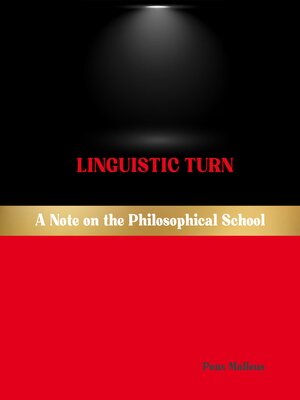Linguistic Turn
audiobook (Unabridged) ∣ A Note on the Philosophical School · Western Philosophical Schools
By Pons Malleus

Sign up to save your library
With an OverDrive account, you can save your favorite libraries for at-a-glance information about availability. Find out more about OverDrive accounts.
Find this title in Libby, the library reading app by OverDrive.



Search for a digital library with this title
Title found at these libraries:
| Library Name | Distance |
|---|---|
| Loading... |
This audiobook is narrated by a digital voice.
In the history of philosophy, few shifts have been as transformative as the "Linguistic Turn." Emerging in the early 20th century, this intellectual movement recast language—not merely as a medium for expressing thought, but as the very framework within which thought itself takes shape. It redirected philosophical inquiry from metaphysical speculation to the analysis of language, ushering in a profound reorientation of how we understand meaning, truth, and reality. This audiobook explores that pivotal moment and its reverberations across the philosophical landscape.
The Linguistic Turn is not the work of a single philosopher or school, but rather a constellation of thinkers—each grappling with the implications of language for philosophy's most enduring questions. From Gottlob Frege's formal semantics and Bertrand Russell's logical atomism, to Ludwig Wittgenstein's shifting views in the Tractatus and Philosophical Investigations, and through the later developments in ordinary language philosophy with figures like J.L. Austin and Gilbert Ryle—the turn represents a kaleidoscope of insights into the power, limits, and structures of language.
At its core, the Linguistic Turn challenges the notion that we can access a pre-linguistic or purely objective reality. It asserts instead that our access to the world is always mediated through language. This has profound consequences: it forces us to reconsider the possibility of objective knowledge, the boundaries of philosophical inquiry, and the function of philosophy itself. For some, like the logical positivists of the Vienna Circle, language became the filter for determining meaningful discourse. For others, language revealed the embeddedness of meaning in use, in form, and in cultural and historical context.







